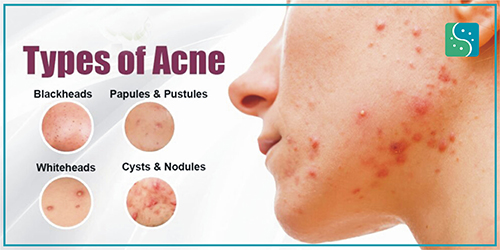ACNE is a common skin condition that happens when hair follicles under the skin become clogged. Sebum oil that helps keep skin from drying out and dead skin cells plug the pores, which leads to outbreaks of lesions, commonly called pimples or zits. Most often, the outbreaks occur on the face but can also appear on the back, chest, and shoulders.
Homoeopathy is very effective and offers a safe and natural treatment for acne. The homoeopathic medicine for acne eliminates eruptions over a period of time and prevents further outbreaks. There are many homoeopathic medicines that are the best for all types of acne. It not only treats acne but also prevents its recurrence and reduces the pigmentation. Several remedies are available to cure acne that can be selected on the basis of individualisation and symptom similarity. For individualized remedy selection and treatment, the patient should consult a qualified homoeopathic doctor.
The medical term for acne is acne vulgaris. Pore blockages in acne produces blackheads, whiteheads and other types of pimples. Pimples are pus-filled, sometimes painful, bumps on your skin. Acne causes several types of lesions, or pimples. Doctors refer to enlarged or plugged hair follicles as comedones. Types of acne include.

Clogged hair follicles or pores cause acne. Your hair follicles are small tubes that hold a strand of your hair. There are several glands that empty into your hair follicles. When too much material is inside your hair follicle, a clog occurs. Your pores can clog with.
When your pores clog, substances plug up your hair follicle, creating a pimple. This triggers inflammation, which you feel as pain and swelling. You can also see inflammation through skin discoloration like redness around a pimple.
Certain things in your environment contribute to acne or they can make an acne breakout worse, including:

Some studies link particular foods and diets to acne, like:
While high-sugar diets may lead to acne outbreaks, chocolate isn’t directly linked to acne.
To reduce your risk of acne, choose to eat a balanced, nutritious diet with plenty of fresh fruits and vegetables, especially those rich in vitamin C and beta-carotene, which helps reduce inflammation.
Acne is largely a hormonal condition that’s driven by androgen hormones (testosterone). This typically becomes active during teenage and young adult years. You might also notice acne forming around the time of your period as a result of hormone activity. Sensitivity to this hormone — combined with surface bacteria on your skin and substances released from your body’s glands — can result in acne.
Yes, sometimes acne can cause scarring. This happens when the acne penetrates the top layer of your skin and damages deeper skin layers. Inflammation makes your acne pores swell and the pore walls start to breakdown, which causes skin damage. Scarring can be a source of anxiety, which is normal. Before treatment, your healthcare provider will determine what type of acne caused your scars. There are several treatment options available for acne scars.
Acne can cause disruptions in your mental health because it affects your appearance and self-esteem. Often, acne development is out of your control if hormones cause it. This can create stress, which can influence future breakouts. Acne can be challenging for teenagers and young adults. If your acne causes you to feel anxious or it prevents you from participating in social activities with your friends and family, talk to a healthcare provider or a mental health professional.
Acne is the most common of all skin conditions and it can have an impact on your mental health and self-esteem. While it may be tempting, try not to prick at your acne or pop pimples to prevent scarring. Homoeopathy is highly effective in treating acne from its root cause with safe and natural medicines. It is also effective in treating pigmentation of the skin and prevents further outbreaks. Homoeopathy is based on the principle of individualisation and symptom similarity by using holistic approach. For individualized remedy selection and treatment, the patient should consult a qualified homoeopathic doctor.